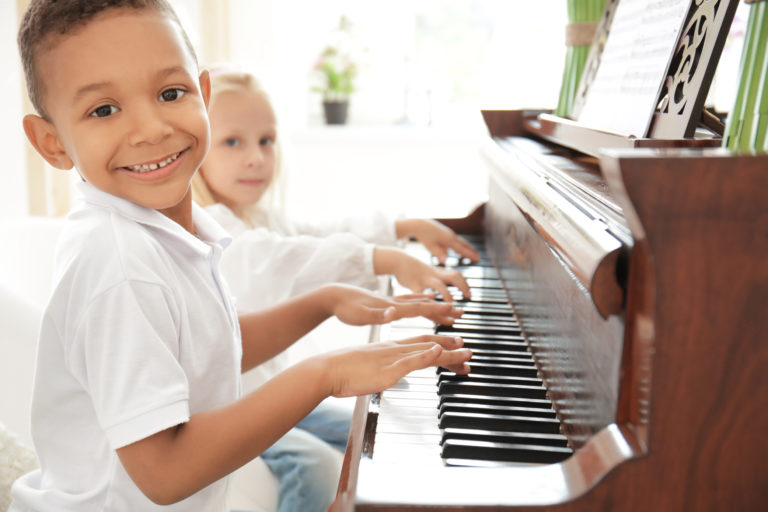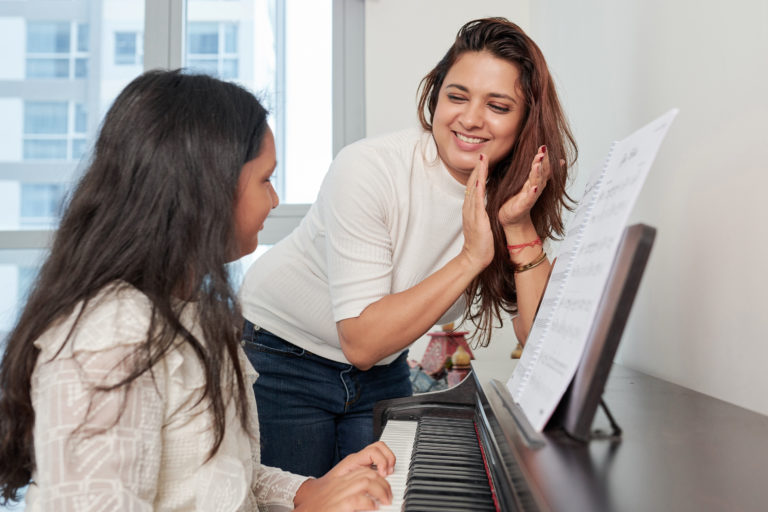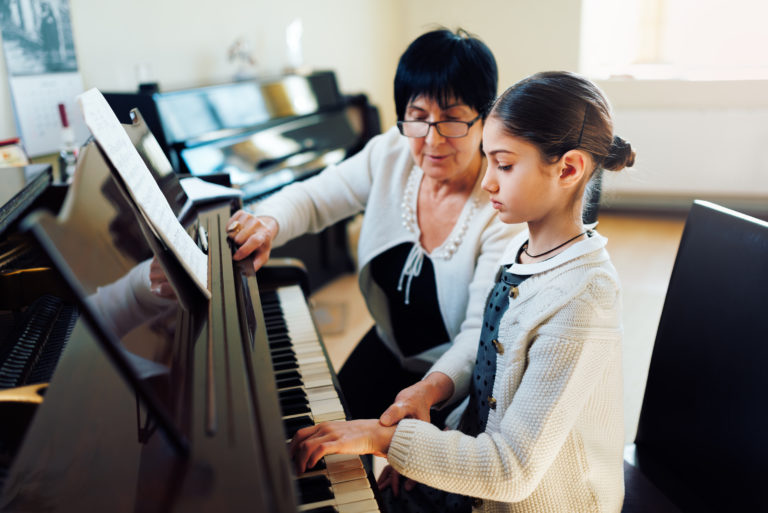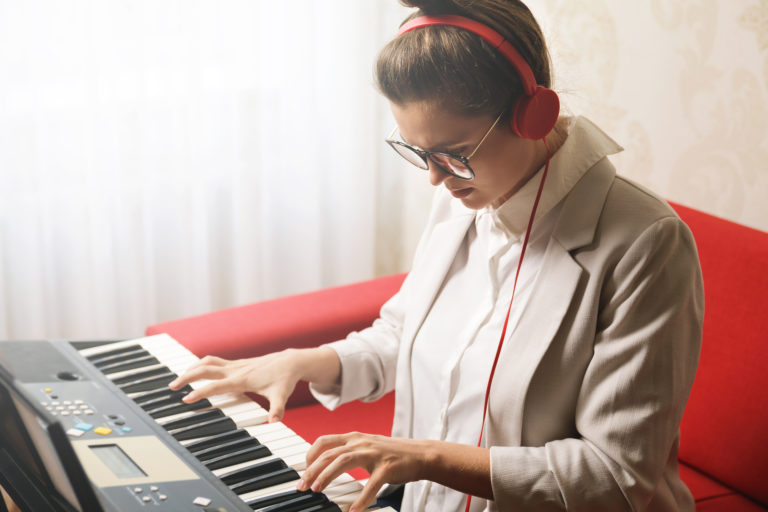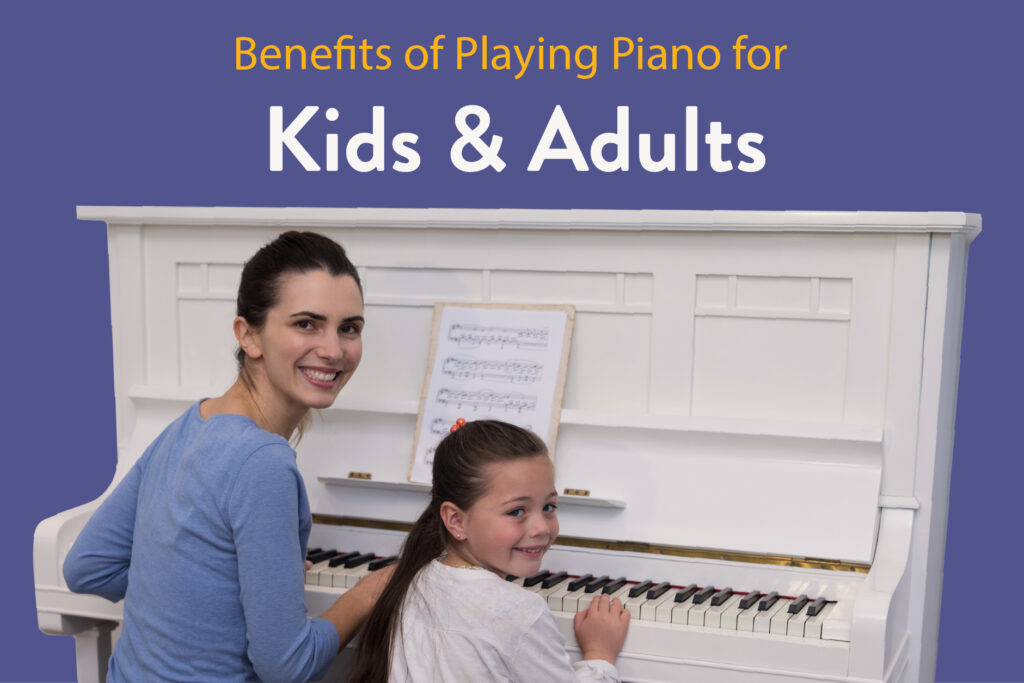Discover the cognitive, physical, and emotional benefits of playing piano
There are so many benefits of playing piano that it’s hard to know where to start! Many scientific studies demonstrate what piano players already know – playing the piano helps develop your mental skills, it strengthens your hands and improves your coordination, and it helps you feel more positive and happy. Let’s take a look at all of these benefits and talk about what playing the piano can do for you!
The benefits of playing piano at a young age
Children who learn to play the piano tend to do better in school for a host of reasons. First of all, playing the piano is a complex skill that challenges the brain to grow and develop. Studies have shown that children who learn the piano have better memory skills, reading skills, math skills, and IQ scores. Even as little as six months of piano lessons seems to improve a child’s ability to learn new things, and this benefit continues throughout life!
For young children, learning the piano also develops more complex brain functions, like attention and self-control. Some scientists have even recommended that piano playing might help those with attention deficit disorders improve their ability to focus.
Learning the piano provides children with a life-long roadmap for success. A child who learns to play the piano experiences first-hand the magic of working on something a little every day and watching their ability grow. This kind of success can lead to higher self-esteem not only in playing the piano but in every aspect of life.
The benefits of playing piano for the brain
Why does playing piano have such a wide range of benefits for the brain? If you think about it, playing piano is a very complex skill that stretches the brain’s abilities. To play the piano, your brain has to keep track of many processes at the same time. Each finger of each hand has to do its part to create the music. In order to accomplish this, the brain has to make new pathways and connections. Whatever you ask your mind and body to do, it will increase in its capacity to do it. Improving the skills that allow you to play piano will also improve your ability to use those skills in all areas of life.
You can think of playing piano as a perfect work-out for your brain. Learning about music theory and music notation helps develop the parts of the brain that house your language skills. Training your hands and fingers to play the keyboard will improve your hand-eye coordination and your spatial awareness. Daily practice will help you develop persistence.
Unexpected benefits of playing the piano for kids
It’s easy to see how learning the piano can help a child’s cognitive development, but have you thought about the ways it can help their social and emotional development too?
A child who plays the piano learns not only how to play notes and rhythms, but how to play with feeling. They’re developing a way to express emotions through sound. To do this, they need to think about what emotions the composer meant to share when they wrote the piece, and also their own feelings about the music. This helps them be more in tune with emotions, both their own and those of others.
While it’s fun to play the piano just for yourself, it’s even more fun to play the piano for others. A child who plays the piano will quickly discover that making music for other people brings happiness both to the performer and the listener. This social aspect of making music is enhanced when playing the piano with a group of performers. To accompany singers, other instruments, or to play with a band requires a piano player to listen carefully, work cooperatively, and be patient with their own and with others’ mistakes. These are all critical social skills that can be applied throughout life.
The piano is an instrument with a long and fascinating history. People from many cultures all over the world have written music for the piano. Learning to play the piano connects children with the past, the global present, and will make music a joyful part of their future.
The benefits of playing the piano for adults
Learning to play the piano doesn’t only benefit children. No matter what age you are, learning piano can sharpen your mental, physical, and emotional skills. Here are some of the things that studies have shown that playing the piano can do for adults:
- Improve executive function
- Inhibition control
- Attention
- Visual scanning
- Motor ability
Older adults who play the piano perform better on tests that are used to detect brain damage, dementia, and age-related mental decline. In fact, some scientists believe that learning piano for older adults could be used as a therapy to help reverse some of the effects of aging on the brain.
Play the piano! It’s good for you.
No matter what age you are or what your level of skill is, there are benefits of playing piano for you. Join the millions of people throughout the centuries who have enjoyed this amazing instrument and all that it has to offer.
